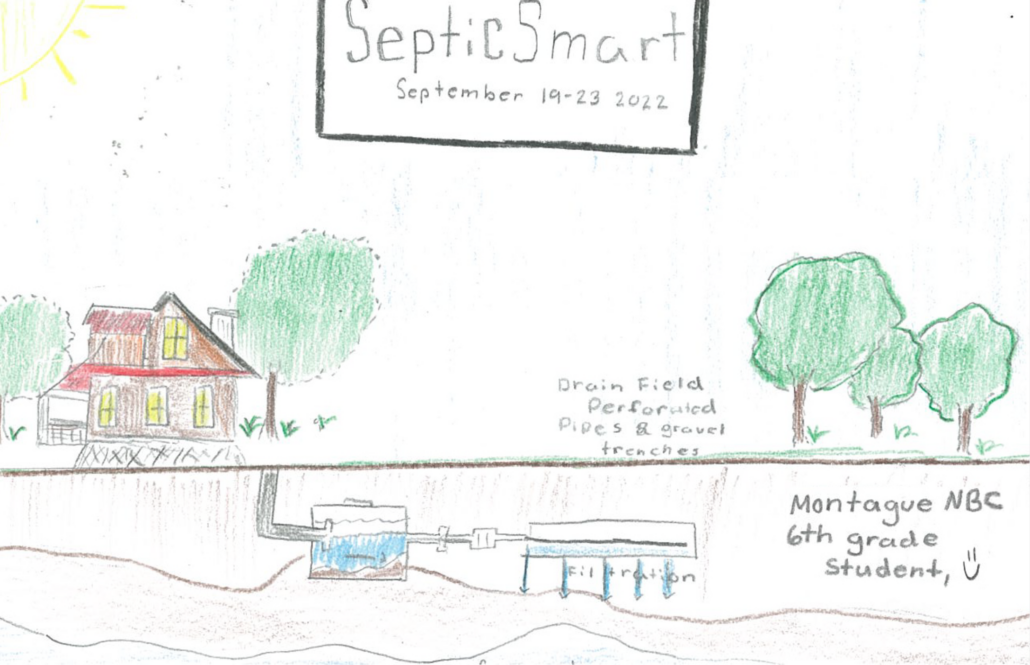By: Mallory Meston, WMEAC Lakeshore Fellow
In 2014, following successful restoration efforts, the U.S. Environmental Protection Agency (EPA) announced that the White Lake Area of Concern was delisted and removed from a binational list of Great Lakes Areas of Concern, waterways with documented water quality impairments. But the work of protecting a lake is never done and White Lake still needs community stewardship and advocacy to keep its water clean!
To help make this happen, West Michigan Environmental Action Council (WMEAC) is sponsoring the Keeping White Lake Water Clean Project, to update local residents on water quality and assist them in properly maintaining their septic systems and tank installation. Properly maintained systems remove pollutants such as bacteria, viruses, and nitrogen that can contaminate groundwater and lakes and rivers, and even drinking water, and can cause public health concerns such as infections or illness.
The project includes student projects, water quality forums, government presentations, and septic system homeowner workshops. Project partners include Public Health Muskegon County and the water resources commissioner; the Muskegon Conservation District; Fruitland and White River Townships; and the Whitehall and Montague Middle School Science Programs.
We are grateful to have the schools’ assistance in creating educational materials about septic systems and water quality and appreciate students stepping up to be the next generation of people taking care of White Lake. “I hope that involving my students in the project will raise their awareness about how our watershed can be affected by human actions and choices. As my students grow up, I hope they will be positive stewards of our environment,” says Jennifer Szegda, a science teacher at Montague Middle School. “At the present,” she adds, “I hope that their participation and development of educational materials will inform and encourage community members to take action to protect our waterways. I also hope to help my students develop environmental citizenship by teaching them to notice the things around them and make responsible decisions about the environment.”
Susan Tate is also eager to participate in this project. “I got involved with the project because I am passionate about protecting our freshwater resources in the White Lake area. I teach a STEM elective class for 6-8th graders at Whitehall Middle School, she stated. “I think it’s essential for my students to engage with authentic science and design solutions to important issues affecting their community.” She has high expectations for the project, concluding, “I hope that this project can raise awareness about protecting our watershed and the importance of properly installing and maintaining septic systems, especially for homeowners who live on White Lake. For my students, I hope that this project also exposes them to STEM careers in the water industry.”
Jeff Marcinkowski, Fruitland Township supervisor, specifically wants to take action with this project. “The main reason I am participating in this project is to bring clean water awareness and initiatives to the residents of Fruitland Township along White Lake, and my highest hope for this project is to bring clean water action steps to residents of Fruitland Township along White lake so that they can implement the awareness and initiatives information.”
White River Township’s clerk, Patti Sargent, cites water as a top reason for her township’s participation. “Two of White River Township’s borders are water: Lake Michigan to the west and White Lake to the south” she points out. “Clean drinkable and enjoyable water are critical for all that live and enjoy White River Township. It is a small price to pay to attempt to educate those that live near or on the lake shore.” She also hopes the project will help prevent pollution. “My highest hope for this project is that sewage will not seep into the water of White Lake and or Lake Michigan and that people will learn how to care for the septic systems they have before it is too late,” concludes.
Michael Eslick, operations manager for Public Health Muskegon County, appreciates that this project will assist in the county’s role in protecting water quality, “Any project that increases awareness and education for residents who own their own and operate their own septic systems is a huge plus for the community. This project definitely checks that box,” he notes” He also recognizes the value of environmental education occurring within the county, “Being a part of this project has shown that our community is actively working to educate and help the community concerning septic waste in Muskegon County.”
“My main reason for participating in this project is to support environmental stewardship at the local level,” Brenda Moore, water resources commissioner for Muskegon County, says. “I hope this project can encourage property owners to engage in consistent septic system management.”
Funding for the project was provided by the Michigan Coastal Management Program, Water Resources Division, Department of Environment, Great Lakes, and Energy, and the National Oceanic and Atmospheric Administration.
Coming soon! September 19-23 is SepticSmart Week! Do your part to protect our water. To attend a workshop on how to maintain septic systems, see HERE. To learn more about maintaining septic systems go to https://www.epa.gov/septic. Or search online for EGLE Septic Smart.
For more information and to participate please contact Tanya Cabala at tcabala@wmeac.org or (231) 798-5196.
Photo by Montague NBC 6th Grade Student.

